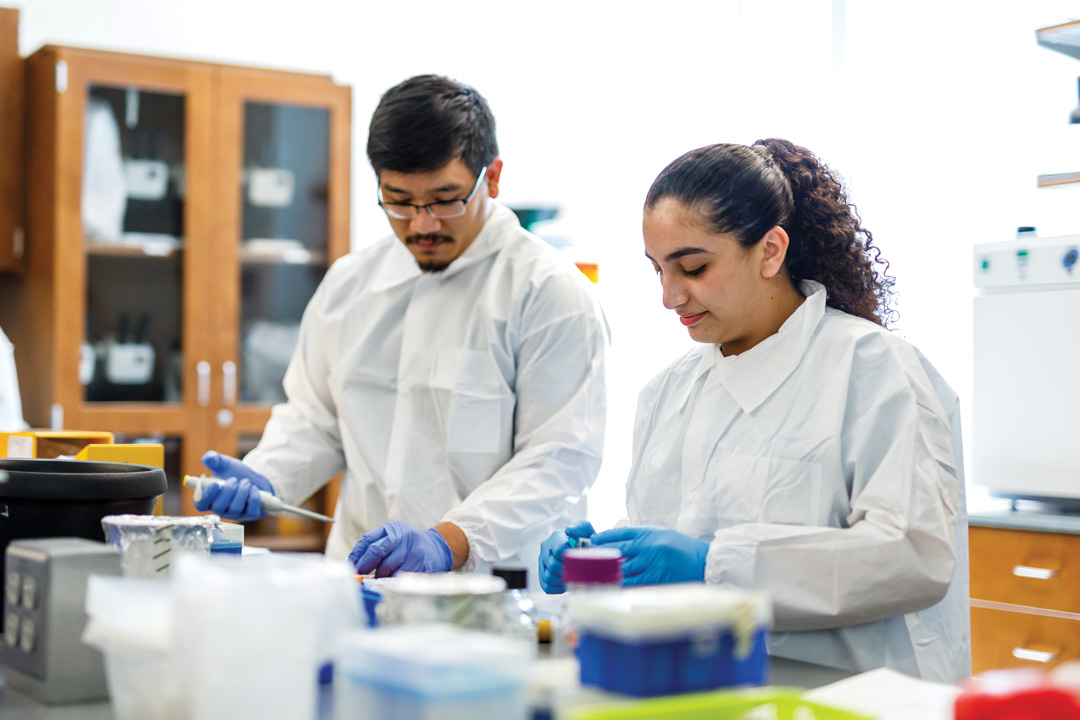
Allied Health Majors
Study Allied Health at Azusa Pacific University
We’ll help you graduate with the science foundation needed for a wide variety of careers—cytotechnology, occupational therapy, physical therapy, radiation technology, nursing, and more. You’ll also gain the essential knowledge and graduate with the prerequisites completed to enter graduate programs in these fields, and support your experience through laboratory work in human anatomy, human physiology, and more.
We offer several allied health degree options:
- Allied Health, BA
- Allied Health, BA, with Business Emphasis
- Allied Health, BS
- Allied Health, BS, with Integrated Single Subject (Science) Teaching Credential
Program at a Glance
Application Deadline
Early Action (Freshmen Only)
- November 15
Regular Decision
- March 1 priority application deadline
- June 1 final deadline
- August 1 final transfer deadline
Program Information
- Program Units: 64-96
Location
- Azusa (Main Campus)

Gain Hands-on Experience
- Perform laboratory based techniques and skills.
- Privilege of cadaver-based learning in first-year courses.
- Understand scientific terminology and nomenclature.
- Consider the ethics of medicine and science through a Christian lens.
By the Numbers
Get Started
Program Details
Allied health encompasses professions that provide technical, therapeutic, and support services within the healthcare field. The Bachelor of Arts in Allied Health program comprises a rigorous curriculum that combines foundational biological, chemical, and physical knowledge with a variety of applied topics including psychology, kinesiology, statistics, and electives tailored to the student’s career goals. This program also provides an environment where undergraduate students can develop a Christian worldview and learn to integrate their faith into their future careers as allied health professionals.
Browse the tabs below—if you have questions, visit the Student Services Center page, and we’ll make sure you get the info you need.
General Undergraduate Admission Requirements
Select an option below:
Requirements for Allied Health, Biochemistry, Biological Sciences, and Chemistry Majors
While the Department of Biology and Chemistry does not cap enrollment in these majors, students are expected to demonstrate certain levels of achievement (detailed below) to enter and remain in these majors.
Freshman Applicants
To qualify for a major in allied health, biological sciences, biochemistry, or chemistry, freshman applicants must submit documentation of the following (or their equivalents) and indicate their choice for one of those majors to the Office of Undergraduate Admissions before the start of classes. After that date, the requirements in the Matriculated APU Students section (below) must be met.
- High school GPA of 3.0+
- At least three years of high school math (an average of C- or better across all three years) or SAT Math score of 530+ or ACT Math score of 21+
- At least 2 years of high school science (with a B or better in either biology or chemistry)
Transfer Applicants
To qualify for a major in allied health, biological sciences, biochemistry, or chemistry, transfer applicants must submit documentation of the following (or their equivalents) and indicate their choice for one of these majors to the Office of Undergraduate Admissions before the start of classes. After that date, the requirements in the Matriculated APU Students section (below) must be met.
- Community college/university GPA of 2.8+
- Completion of Intermediate Algebra or higher (C- or better)
- Completion of a one-semester science course (C- or better, biology or chemistry course recommended)
Matriculated APU Students
To qualify for a major in allied health, biological sciences, biochemistry, or chemistry, matriculated APU students must submit evidence of all of the following:
- Completion of BIOL 151 or CHEM 151 (C- or higher)
- Completion of MATH MATH 95, current ALEKS score of 45+, SAT Math score of 530+, or ACT Math score of 21+
- Completion of prospective major advising in the Department of Biology and Chemistry
Department Policies
The following are policies that apply to all students in courses offered by the department:
- A student must complete all prerequisites for a BIOC, BIOL, or CHEM course with a C- or better before taking the course (except as noted in the course description).
- Students with a total of three unsuccessful attempts (below C-) in any combination of BIOC, BIOL, and CHEM courses will be automatically dropped from subsequent enrollment in department courses.
- Any single BIOC, BIOL, or CHEM course may only be taken two times at APU.
- Students may not earn a chemistry minor if they are majoring in biochemistry, nor may they earn a biology minor if they are majoring in allied health or biochemistry.
- Students missing more than three labs in a course receive an automatic F in the course.
- Courses with labs in an online or correspondence format are not allowed to transfer as BIOC, BIOL, or CHEM courses.
Additional Requirements for Allied Health, Biochemistry, Biological Sciences, and Chemistry Majors
All of the following requirements must be met to continue as an allied health, biological sciences, biochemistry, or chemistry major. Failure to maintain these requirements will result in a student being dropped from the major. Reentry to the major is by petition only.
- A minimum cumulative GPA of 2.0 in all biological sciences, chemistry, biochemistry, math, and physics courses required for the major must be maintained.
- A student must complete each BIOC, BIOL, or CHEM course with a C- or higher for the course to meet a degree requirement in the Department of Biology or Chemistry.
- Any single class within the major can only be taken two times at APU; students must change to a major outside the department after two unsuccessful (below C-) attempts in a single required course.
- Only two courses total within the major can be repeated; students must change to a major outside the department after unsuccessful (below C-) attempts in any three required courses.
- All majors are required to take BIOL 496 to meet their General Education Senior Seminar or Writing 3 requirement.
- While courses required of the major may be taken at other accredited institutions, subject to approval via a transfer inquiry form, both lecture and laboratory components must be taken at the same institution in the same semester.
- It is strongly recommended that freshmen in all biological sciences majors (including biochemistry) take General Chemistry I (CHEM 151) and General Biology I (BIOL 151) the first year, and that chemistry majors start with General Chemistry I (CHEM 151) and Calculus I (MATH 165) the first year. Should math placement assessment require algebra of the student, then that class should be taken the first year and a five-year program may be indicated.
- BIOL 151 should be taken by allied health, biochemistry, or biological sciences majors who receive AP biology credit. Many medical schools and graduate programs will not accept AP biology to meet requirements for admission. AP credit for BIOL 151 will be given only with approval of the chair of the Department of Biology and Chemistry.
- Students may take a maximum of 3 units total from BIOL 390, BIOL 391, BIOL 490, BIOL 497, or BIOL 498a for elective credit toward the BS in Allied Health or the BS in Biological Sciences.
The following courses may not be taken to meet upper-division elective requirements in any major in the department:
- BIOL 325 Humans and the Environment (4 units)
- BIOL 330 Gender Differences (3 units)
- BIOL 400 Science and Children (4 units)
- BIOL 470 Science for the MCAT (1 unit)
You might think that a private college education is beyond your reach, but there are many financial resources available to help make an Azusa Pacific education a reality. APU students may take advantage of three basic types of financial aid: scholarships and grants, education loans, and student employment.
Scholarships and Grants
Scholarships and grants are considered “gift aid” and do not require repayment. They can come from federal, state, or private sources. Scholarships are typically merit-based, meaning they are awarded depending on demonstrated academic ability or other specific talents.
Scholarships are often available from sources outside of APU. You can search for these scholarships through websites such as finaid.org or fastweb.com. The Student Services Center is sometimes notified of scholarships available through APU departments or local organizations, and can provide information about any available scholarships on request.
Education Loans
Education loans are usually repaid after graduation, may be deferred until after graduate school, and often have very low interest rates.
Military Benefits
Military members—and in some cases their spouses and dependents—qualify for financial assistance covering tuition, housing, and books. Azusa Pacific is a Yellow Ribbon University and Military Friendly School, so you can be confident that you’ll receive the benefits and flexibility you need to complete your education.
Student Employment
On-campus student employment is available for students needing additional income to pay for education-related expenses. APU students also find work off campus in the surrounding community.
Net Price Calculator
We’re committed to helping families understand early in the college search process the value of the APU experience and options for affordable financing of a top-tier Christian university education.
Now that you’re familiar with the financial aid opportunities available to APU students,
it’s time to estimate what your true cost may be to attend Azusa Pacific. Remember,
estimations are only as accurate as the information you provide. Click on the Net
Price Calculator button below to begin.
Net Price Calculator
To view specific requirements and coursework information, visit the current academic
catalog:
Allied Health, BS, with Integrated Single Subject (Science) Teaching Credential
The Bachelor of Arts in Allied Health degree with an emphasis in business prepares students for industry and government jobs that require a background in science and business, such as those in healthcare administration, pharmaceutical and biotechnology companies, the Environmental Protection Agency, the Food and Drug Administration, public health departments, and more. Additional coursework may be required to meet specific job specifications.
To view specific requirements and coursework information, visit the current academic catalog:
Allied Health, BA, with Business Emphasis
WASC Senior College and University Commission (WSCUC).
Career Outlooks and Outcomes
Featured Faculty

Ryan Somers
Assistant Professor, Department of Biology and Chemistry

Marian Saleh
Assistant Professor, Department of Biology and Chemistry